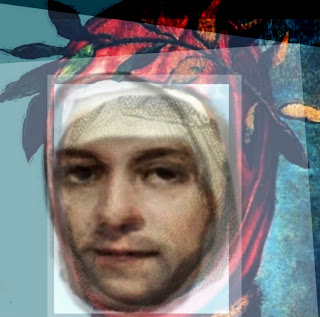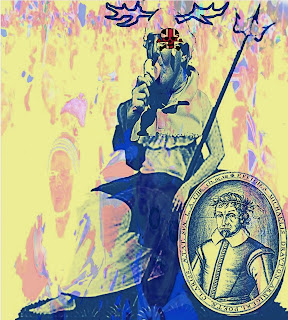The Relevant Posts:
https://en.wikipedia.org/wiki/Philip_Jeck
It with great sadness that I am blogging about the life (but alas the death) of Philip Jeck, the musician, but also a friend of well over a decade, and a near-neighbour (and friend of other mutual friends too, both in Liverpool and elsewhere). I am writing this on the Sunday after the Friday on which he died. (I was not going to post it until I had seen official announcements elsewhere. Searching for the informative links above, I see that Touch, his record label, has quietly announced the fact in the last hour.) We were going to visit him on Saturday and found out just before we’d planned to leave that we were too late. (We had spoken on the phone the week before.)
There were many Philip Jecks, and there still are. He
was foremost a musician – and his performances of turntable music was touched
with genius. The sonic textures he built up and released were extraordinary and
the result of his unique ear, and the product of hours of improvisatory
performance and prepared recording. (He managed to cross the boundary between the
two.) Music produced by this method is often weak laptronica,
processual, whereas Phil was symphonic and lush. This was obvious in live performance,
whether his re-visiting of his earlier Vinyl Junkyard, his
collaborations with Janek Schaffer and Jonathan Raison, or his solo work,
whether at the Bluecoat, with a public audience, or at Netti’s Kitchen, an annual
invite-only kitchen performance. (I’m limiting myself to performances I
witnessed. He also read poetry and prose at the Gramophone Ray Gun readings (and he was
usually at my Liverpool readings over the last decade. He was a great reader of poetry).)
Another Phil was the record collector and enthusiast, of
all kinds of music, experimental to pop, Basinski to Beyonce, one might say,
but our tastes met in a love of Frank Sinatra and bossa nova (and perhaps blended
perfectly in the albums Sinatra made with Antonio Carlos Jobim). We often
listened to his choice of music. The last time I saw him it was to listen to
the whole of his latest album, which was quite different from earlier
work, being a collaboration with a volcalist: Stardust
with Faith Coloccia (2021, Touch). (He also has a video, made with Mary Prestidge, in a current exhibition
at the Bluecoat.)
Our thoughts are with Mary and Louis (both currently down with Covid). Mary’s just phoned up to ask for a pint of milk.
*
I wrote one poem for Phil, a fake ‘album’ (vinyl, because there is an A and a B side!). It is not a description of a Jeck album (as is clear from the above, I lack the words to describe what he did). It is a response to the kinds of impressionistic language that was often used in magazines like The Wire and I imagined a vinyl album in, or of, words.
You may read it here: Robert Sheppard - Spring 15 (blazevox.org) . You need to scroll down to find it. But now, the following morning, I've been fiddling with the text (which I've lined up for a book or section of a book that relates to music) and here's the reworked poem. It was written for Phil's 60th birthday (his birthday was 15th November, the day after mine, different year).
Spectres of Breath
Compilation album for Philip Jeck
Side A
Wispy digital noodling, with woozy laptronica lines over clipped guitar riffs, humming bowls, unprepared piano, Noise quotes
Post-punk guitar-scuzz, amid a wash of tone fluctuation, psych-garage munge with soun’tracky form-sloth jiggers, over vocaleering dream lounge flair
Serpentine drones with rough camel skin gauze, filtered through punchy kook-oriented space-electronic phrases, low-bore gush and drool, segueing to raw hypnagogic handclaps
A live jack lead, plugged into a bass valve-amp, crackles, while yacht rock tropes think through ring-modulated nasal sustain
Torch songs with Morricone twangs, dubbed out by reggae-funk lite, for clubfooted clomping along to burps, blips, dips and clanks
Washed-out melancholia, junkyard jams alternating with palm-muted bleeps and trickles, plangent bird calls and fluttering wings
Side B
Smell the pixels on these ice-cracking fire-spitting loops, re-mixing bathysphere pings, amid scorched-earth saxes played by improv avant-allstars
Effete acoustic jangle against lacquered finish, with FX and channel bravado, opens polished black space for scrying, to glimmer until cycling chords crescendo and ring silence
Styluses scraped against spinning bodies, an entire spectrum of partials grounded by synth-puffs and granular pitches
Spectres of breath in arrangements, layered up from scratch glossolalia, elbowed by tonal clusters, vocal sighs, and automobile-shudder basslines
Bitcrunched microtones and pitchbending grinds sunk in a seedbed of screaming
A pop
savvy barrage of dense keyboard doodles, clenched multiphonics on bassoon,
motoric minimalism of ghostly warbling, organ clusters, bone-rattling
brittleness in the voice, so convivial you can taste the retro crazed latency
that gives it human tape hiss






















